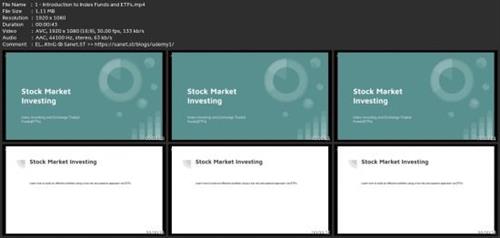- Thread Starter
- #1
Index Funds & Etfs: Complete Guide To Passive Investing

Learn to build and manage a profitable portfolio with index funds and ETFs, mastering rebalancing, compounding, and risk
What you'll learn
Understand the basics of index funds, ETFs, and passive investing
Learn how to research, select, and invest in index funds and ETFs
Build and manage a diversified portfolio for long-term growth
Master portfolio rebalancing techniques and frequency
Explore risk management strategies for different investor types
Use compounding to maximize portfolio growth over time
Analyze model portfolios to create a balanced investment strategy
Understand dividends and how to reinvest them for maximum returns
Requirements
No prior investing experience is required; beginners are welcome
A basic understanding of financial terms can be helpful but not necessary
Willingness to learn about long-term investing and financial growth strategies
An interest in building and managing a portfolio with index funds and ETFs
Description
Are you looking to build wealth and achieve long-term financial growth using a proven, low-cost investment strategy? This comprehensive course on Index Funds and ETFs is designed to teach you how to build, manage, and optimize a profitable portfolio with minimal effort. Whether you're a beginner or an experienced investor, you'll learn step-by-step how to make passive investing work for you.In this course, you'll dive deep into index funds, ETFs, and passive investing strategies. You'll discover how to select the right funds, manage risk, and use rebalancing techniques to maintain a balanced portfolio. We'll explore how compounding can accelerate your portfolio's growth and how dividends play a role in your overall returns.Throughout this course, you'll also gain practical insights on how to choose the right brokerage, understand different account types, and allocate funds wisely across various investments. Real-world examples using popular tools like Yahoo Finance will show you how to research ETFs and analyze key performance metrics. Plus, you'll walk through creating diversified portfolios tailored to your risk tolerance and financial goals, using well-known funds like Vanguard and iShares.By the end of this course, you'll have the knowledge and confidence to:Build a diversified portfolio with index funds and ETFsUnderstand the mechanics of index funds, mutual funds, and ETFsMake informed decisions on risk management and rebalancingLeverage the power of compounding for long-term wealth growthResearch and select ETFs using popular platforms and data toolsCreate model portfolios that suit your financial goals and risk profileMaximize your investment returns using dividends and smart allocation strategiesWith clear, practical guidance and hands-on examples, you'll leave this course ready to manage your own passive investment portfolio with confidence.Join now and take the first step towards mastering the art of passive investing with index funds and ETFs!
Overview
Section 1: Introduction to Index Funds and ETFs
Lecture 1 Introduction to Index Funds and ETFs
Lecture 2 Course Overview: What You'll Learn
Lecture 3 Understanding What an Index Is
Lecture 4 What Are Index Funds?
Lecture 5 What Are Mutual Funds?
Lecture 6 What Are Exchange-Traded Funds (ETFs)?
Lecture 7 How ETFs Work: A Closer Look
Lecture 8 Why Invest with Index ETFs?
Section 2: Banks and Brokerages for Investing in Index ETFs
Lecture 9 Choosing Banks and Brokerages for Investing
Section 3: Understanding Different Account Types for Investing
Lecture 10 Different Account Types for Investing in Index ETFs
Lecture 11 What Are Margin Accounts
Section 4: How to Allocate Funds to Different Account Types
Lecture 12 Allocating Funds to U.S. Account Types
Lecture 13 Allocating Funds to Canadian Account Types
Section 5: How to Research ETFs
Lecture 14 How to Research ETFs: Key Information to Consider
Lecture 15 Example: Researching and Analyzing the SPY ETF
Lecture 16 Example: Researching and Analyzing the QQQ ETF
Section 6: Designing a Portfolio from Scratch
Lecture 17 Managing Risk in Equity Portfolios with Fixed Income Assets
Lecture 18 Exploring Portfolio Types: Aggressive, Growth, and Balanced
Section 7: Designing Diversified Portfolios with ETFs
Lecture 19 Building a Diversified Portfolio with Vanguard ETFs
Lecture 20 Creating an Aggressive Model Portfolio with Vanguard ETFs
Lecture 21 Creating a Growth Model Portfolio with Vanguard ETFs
Lecture 22 Creating a Balanced Model Portfolio with Vanguard ETFs
Lecture 23 Quiz: Creating Portfolios with BlackRock iShares ETFs
Section 8: How Much and How Often to Contribute to Your Portfolio
Lecture 24 Determining Contribution Amounts Based on Portfolio Type
Lecture 25 How Frequently Should You Contribute to Your Portfolio?
Section 9: Rebalancing Your Portfolio for Optimal Performance
Lecture 26 Rebalancing Your Portfolio: What, How, and How Often
Section 10: Understanding Dividends in Your Portfolio
Lecture 27 What Are Dividends and How to Use Them for Portfolio Growth
Section 11: Exploring Common Portfolio Types
Lecture 28 Common Portfolio Types Using Broad Market Index Funds and ETFs
Section 12: Popular ETFs for Diversified Portfolios
Lecture 29 Common ETFs for Building Diversified Portfolios
Lecture 30 Quiz: Comparing VEQT and XEQT Asset Allocation Funds
Section 13: The Power of Index Funds, Compounding, and Long-Term Growth
Lecture 31 Why Index Funds and ETFs Are Essential for Long-Term Investment Success
Lecture 32 S&P 500: A Walkthrough of Historical Performance
Lecture 33 Using a Compound Interest Calculator: Exploring Potential Gains
Section 14: Final Thoughts and Course Wrap-Up
Lecture 34 Closing Reflections and Next Steps
Beginner Investors: Individuals looking to start their investing journey with a solid foundation in index funds and ETFs,Intermediate Investors: Those wanting to deepen their knowledge of passive investing strategies and portfolio management,Finance Enthusiasts: Anyone interested in understanding the benefits of index investing and how to effectively manage a diversified portfolio,Students: Individuals studying finance or related fields who want practical insights into index funds and ETFs,Busy Professionals: People seeking a simple, effective approach to investing that requires minimal time and effort,Retirees: Those looking to create a sustainable investment strategy for long-term financial security

Say "Thank You"
rapidgator.net:
ddownload.com:

Published 10/2024
MP4 | Video: h264, 1920x1080 | Audio: AAC, 44.1 KHz
Language: English | Size: 445.83 MB | Duration: 2h 15m
MP4 | Video: h264, 1920x1080 | Audio: AAC, 44.1 KHz
Language: English | Size: 445.83 MB | Duration: 2h 15m
Learn to build and manage a profitable portfolio with index funds and ETFs, mastering rebalancing, compounding, and risk
What you'll learn
Understand the basics of index funds, ETFs, and passive investing
Learn how to research, select, and invest in index funds and ETFs
Build and manage a diversified portfolio for long-term growth
Master portfolio rebalancing techniques and frequency
Explore risk management strategies for different investor types
Use compounding to maximize portfolio growth over time
Analyze model portfolios to create a balanced investment strategy
Understand dividends and how to reinvest them for maximum returns
Requirements
No prior investing experience is required; beginners are welcome
A basic understanding of financial terms can be helpful but not necessary
Willingness to learn about long-term investing and financial growth strategies
An interest in building and managing a portfolio with index funds and ETFs
Description
Are you looking to build wealth and achieve long-term financial growth using a proven, low-cost investment strategy? This comprehensive course on Index Funds and ETFs is designed to teach you how to build, manage, and optimize a profitable portfolio with minimal effort. Whether you're a beginner or an experienced investor, you'll learn step-by-step how to make passive investing work for you.In this course, you'll dive deep into index funds, ETFs, and passive investing strategies. You'll discover how to select the right funds, manage risk, and use rebalancing techniques to maintain a balanced portfolio. We'll explore how compounding can accelerate your portfolio's growth and how dividends play a role in your overall returns.Throughout this course, you'll also gain practical insights on how to choose the right brokerage, understand different account types, and allocate funds wisely across various investments. Real-world examples using popular tools like Yahoo Finance will show you how to research ETFs and analyze key performance metrics. Plus, you'll walk through creating diversified portfolios tailored to your risk tolerance and financial goals, using well-known funds like Vanguard and iShares.By the end of this course, you'll have the knowledge and confidence to:Build a diversified portfolio with index funds and ETFsUnderstand the mechanics of index funds, mutual funds, and ETFsMake informed decisions on risk management and rebalancingLeverage the power of compounding for long-term wealth growthResearch and select ETFs using popular platforms and data toolsCreate model portfolios that suit your financial goals and risk profileMaximize your investment returns using dividends and smart allocation strategiesWith clear, practical guidance and hands-on examples, you'll leave this course ready to manage your own passive investment portfolio with confidence.Join now and take the first step towards mastering the art of passive investing with index funds and ETFs!
Overview
Section 1: Introduction to Index Funds and ETFs
Lecture 1 Introduction to Index Funds and ETFs
Lecture 2 Course Overview: What You'll Learn
Lecture 3 Understanding What an Index Is
Lecture 4 What Are Index Funds?
Lecture 5 What Are Mutual Funds?
Lecture 6 What Are Exchange-Traded Funds (ETFs)?
Lecture 7 How ETFs Work: A Closer Look
Lecture 8 Why Invest with Index ETFs?
Section 2: Banks and Brokerages for Investing in Index ETFs
Lecture 9 Choosing Banks and Brokerages for Investing
Section 3: Understanding Different Account Types for Investing
Lecture 10 Different Account Types for Investing in Index ETFs
Lecture 11 What Are Margin Accounts
Section 4: How to Allocate Funds to Different Account Types
Lecture 12 Allocating Funds to U.S. Account Types
Lecture 13 Allocating Funds to Canadian Account Types
Section 5: How to Research ETFs
Lecture 14 How to Research ETFs: Key Information to Consider
Lecture 15 Example: Researching and Analyzing the SPY ETF
Lecture 16 Example: Researching and Analyzing the QQQ ETF
Section 6: Designing a Portfolio from Scratch
Lecture 17 Managing Risk in Equity Portfolios with Fixed Income Assets
Lecture 18 Exploring Portfolio Types: Aggressive, Growth, and Balanced
Section 7: Designing Diversified Portfolios with ETFs
Lecture 19 Building a Diversified Portfolio with Vanguard ETFs
Lecture 20 Creating an Aggressive Model Portfolio with Vanguard ETFs
Lecture 21 Creating a Growth Model Portfolio with Vanguard ETFs
Lecture 22 Creating a Balanced Model Portfolio with Vanguard ETFs
Lecture 23 Quiz: Creating Portfolios with BlackRock iShares ETFs
Section 8: How Much and How Often to Contribute to Your Portfolio
Lecture 24 Determining Contribution Amounts Based on Portfolio Type
Lecture 25 How Frequently Should You Contribute to Your Portfolio?
Section 9: Rebalancing Your Portfolio for Optimal Performance
Lecture 26 Rebalancing Your Portfolio: What, How, and How Often
Section 10: Understanding Dividends in Your Portfolio
Lecture 27 What Are Dividends and How to Use Them for Portfolio Growth
Section 11: Exploring Common Portfolio Types
Lecture 28 Common Portfolio Types Using Broad Market Index Funds and ETFs
Section 12: Popular ETFs for Diversified Portfolios
Lecture 29 Common ETFs for Building Diversified Portfolios
Lecture 30 Quiz: Comparing VEQT and XEQT Asset Allocation Funds
Section 13: The Power of Index Funds, Compounding, and Long-Term Growth
Lecture 31 Why Index Funds and ETFs Are Essential for Long-Term Investment Success
Lecture 32 S&P 500: A Walkthrough of Historical Performance
Lecture 33 Using a Compound Interest Calculator: Exploring Potential Gains
Section 14: Final Thoughts and Course Wrap-Up
Lecture 34 Closing Reflections and Next Steps
Beginner Investors: Individuals looking to start their investing journey with a solid foundation in index funds and ETFs,Intermediate Investors: Those wanting to deepen their knowledge of passive investing strategies and portfolio management,Finance Enthusiasts: Anyone interested in understanding the benefits of index investing and how to effectively manage a diversified portfolio,Students: Individuals studying finance or related fields who want practical insights into index funds and ETFs,Busy Professionals: People seeking a simple, effective approach to investing that requires minimal time and effort,Retirees: Those looking to create a sustainable investment strategy for long-term financial security
Screenshots

Say "Thank You"
rapidgator.net:
You must reply in thread to view hidden text.
ddownload.com:
You must reply in thread to view hidden text.
